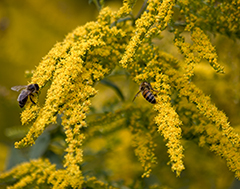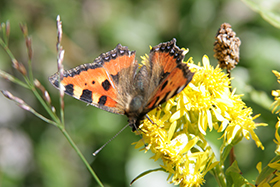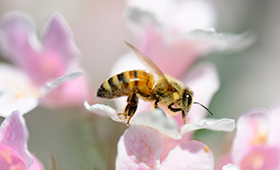Innovations in Organic Food Systems for Sustainable Production and Enhanced Ecosystem Services
 1.-2. november, 2014: Renaissance Long Beach Hotel, Renaissance Ballroom III-IV, 111 East Ocean Boulevard, Long Beach, California, USA.
1.-2. november, 2014: Renaissance Long Beach Hotel, Renaissance Ballroom III-IV, 111 East Ocean Boulevard, Long Beach, California, USA.
ICROFS organised jointly with the US Department of Agriculture (USDA), and the Organic Management Systems Group of American Society of Agronomy (ASA-OMS) an International Conference that took place 1-2 November 2014 Long Beach, California.
Speakers from 12 OECD countries presented developments of organic food systems and potentials for sustainable production and enhanced ecosystem services.
The Co-operative Research Programme on Biological Resource Management for Sustainable Agricultural Systems under the Organisation for Economic Co-operation and Development, (OECD), sponsored the participation of 13 invited speakers from outside the US while the USDA provided sponsorship for the 7 invited speakers from the US.
The 2-day conference was held as a special symposium of the annual conference of the three societies American Society of Agronomy (ASA), Crop Science Society of America (CSSA) and Soil Science Society of America (SSA).
NEW: The proceedings from the conference are published as a special issue of Sustainable Agriculture Research Vol. 4, No. 3, August 2015.
Download the full proceedings as pdf here or read the individual articles on-line at Sustainable Agriculture Research.
Ecosystem Services ‘Natural capital – our ecosystems, biodiversity, and natural resources – underpins economies, societies and individual well-being’. This is emphasized in various ways in reports from the ‘The economics of ecosystems and biodiversity (TEEB)’ - an initiative of the G8+5 countries launched in 2007. The provision of goods and services by many ecosystems is still poorly understood. In addition the eco-system services are often not valued or they are taken for granted.
‘Natural capital – our ecosystems, biodiversity, and natural resources – underpins economies, societies and individual well-being’. This is emphasized in various ways in reports from the ‘The economics of ecosystems and biodiversity (TEEB)’ - an initiative of the G8+5 countries launched in 2007. The provision of goods and services by many ecosystems is still poorly understood. In addition the eco-system services are often not valued or they are taken for granted.
There is growing evidence that many ecosystems have been degraded to such an extent that they are nearing critical thresholds, beyond which their capacity to provide useful services may be drastically reduced. Unsustainable agricultural practices have been pointed to as the chief causes of land degradation. Seventeen percent of the world’s soil has been ‘strongly degraded’ and areas of degradation are growing. Biodiversity is under pressure also as a result of human activities. The loss of biodiversity at a global level has been estimated to have exceeded by far what has been referred to as the planetary boundary for safe ‘operating space.
Sustainable Intensification in Organic agriculture
Organic agriculture as defined by IFOAM relies on ecological processes, biodiversity and cycles adapted to local conditions based on agro-ecological approaches holds the potential for a substantial contribution to sustainable global food production. Intensification in organic agriculture means intensifying the beneficial effects of ecosystem functions, including soil fertility and biodiversity, and using the biological elements of the eco-systems in a structured, organized and more efficient way, so-called eco-functional intensification. Organic agriculture is one of the best developed multifunctional production strategies in agriculture, however, most often with a lower productivity than high input conventional agriculture. Therefore, eco-functional intensification with improved nutrient cycling techniques and agro-ecological methods for enhancing diversity and health of soils, crops and live-stock is a priority for organic research.
See conference programme
See conference leaflet
See the CSA News magazine report from the conference here under "Meetings".
Without login you can see a one-page preview of the article written by
Lise Andreasen, Ellen Mallory, Niels Halberg, Mathieu Ngouajio, and Kathleen Delate.
Conference presentations
 Some of the conference presentations are available below. Read also the post Maria Gaura of OFRF did on professor Heikki Hokkanens talk at the OECD conference:
Some of the conference presentations are available below. Read also the post Maria Gaura of OFRF did on professor Heikki Hokkanens talk at the OECD conference:
Researcher Enlists Honeybees as “Flying Doctors” Against Crop Disease
Welcome/Opening Sessions
The OECD Co-operative Research Programme (CRP)
Dr. Hans-Joachim Weigel OECD-CRP SAB member
Presentation of USDA NIFA: Organic Agriculture Funding & Priorities in the U.S.
Dr. Mathieu Ngouajio
The International Centre for Research in Organic Food System (ICROFS) of Denmark.
Dr. Louise Jackson, UC-Davis, Member of ICROFS International Board
Global Perspectives of Organic Food Systems, Sustainable Production and Ecosystems Services
Eco- functional intensification and food security: Synergy or Compromise?
Niels Halberg, International Centre for Research in Organic Food Systems, Denmark
Long-Term Organic Comparisons in the U.S.
Kathleen Delate, Depts. of Horticulture and Agronomy, Iowa State University
The role of livestock in eco-functional intensification of organic agriculture
Mette Vaarst, Institute of Animal Sciences University of Aarhus
Opportunities for Meeting Ecosystem Services Challenges with Organic Farming
Designing organic cropping systems for improved nutrient cycling and soil health
Prof. Derek Lynch, Dalhousie University, Canada
Soil health and related eco-system services in organic agriculture.
Prof. Lynette Abbott, University of Western Australia, Australia
Optimizing Cropping Techniques for Nutrient and Environmental Management in Organic Agriculture
Prof. Ulrich Köpke, University of Bonn, Germanyt
Organic No-Till with Roller/Crimpers: Agroecosystem Services and Practical Applications
Dr. Stefano Canali, Agricultural Research Council, The Research Centre for the Soil-Plant System (CRA-RSP), Italy
Prof. Heikki Hokkanen, University of Helsinki, Finland
Cover crops: Opportunities and challenges to realizing ecosystem services in organic agriculture
Dr. Steven Mirsky, USDA-ARS, USA
Water Quality in Organic Systems
Dr. Cynthia Cambardella, USDA-ARS, USA
Functional biodiversity in organic systems: the way forward?
Prof. Paolo Barberi, Sant’Anna School of Advanced Studies, Italy
Prof. Henrik Moller, University of Otago, New Zealand
Research and Innovation Challenges in Organic Production for Sustainable Development and Ecosystem Services
From organic to agro-ecosystem research – a challenge
Prof. Urs Niggli, Director, FIBL, Switzerland
Supporting innovation in organic agriculture: A European perspective?
Dr. Susanne Padel, the Organic Research Centre (ORC), Elm Farm, United Kingdom
Prof. Erik Steen Jensen, Swedish University of Agricultural Sciences, Sweden
Keeping the organic system learning: the role of organic farmers’ experiments
Prof. Christian R. Vogl - University of Natural Resources and Life Sciences, Vienna, Austria
Meeting top challenges of producers – innovations in organic research and policy
Dr. Catherine Greene - Economic Research Service, USDA